Get started quickly, see results immediately, no code needed.
13 Best Workflow Automation Platforms (Powerful Process Automations)
For businesses striving for optimal efficiency, the emergence of workflow automation platforms has become a game-changer.
So if you’re tired of drowning in repetitive tasks and struggling to keep up with complex workflows, look no further!
Workflow automation platforms are here to revolutionize your work, providing a transformative solution to your productivity.
Imagine a scenario where manual processes are seamlessly automated, liberating your team from the shackles of mundane tasks.
This is how workflow automation platforms work, where streamlined processes and increased productivity become the norm.
In this blog post, we embark on a journey of workflow automation platforms.
We will explore their features, benefits, and real-life examples, providing you with the knowledge and insights to make informed decisions for your business.
So, let’s revolutionize your workflows, supercharge your efficiency, and set your business on a trajectory of success!
What is workflow automation?
But what exactly is workflow automation?
In simple terms, it refers to automating repetitive tasks and streamlining business operations to improve efficiency.
For example, companies can optimize their processes, reduce manual errors, and enhance productivity by employing workflow automation.
Many companies have already recognized the importance of integrating automation into customer relationship management (CRM) systems.
Workflow automation in CRM can significantly enhance customer interactions by automating lead nurturing, follow-ups, and customer support processes.
This helps businesses provide timely and personalized responses, improving customer satisfaction and loyalty.
When considering workflow automation, choosing a platform that aligns with your business goals and requirements is essential.
Look for features like visual workflow design, integration capabilities, and ease of use.
Keep reading to discover the three best workflow automation platforms currently available.
13 best workflow automation platforms
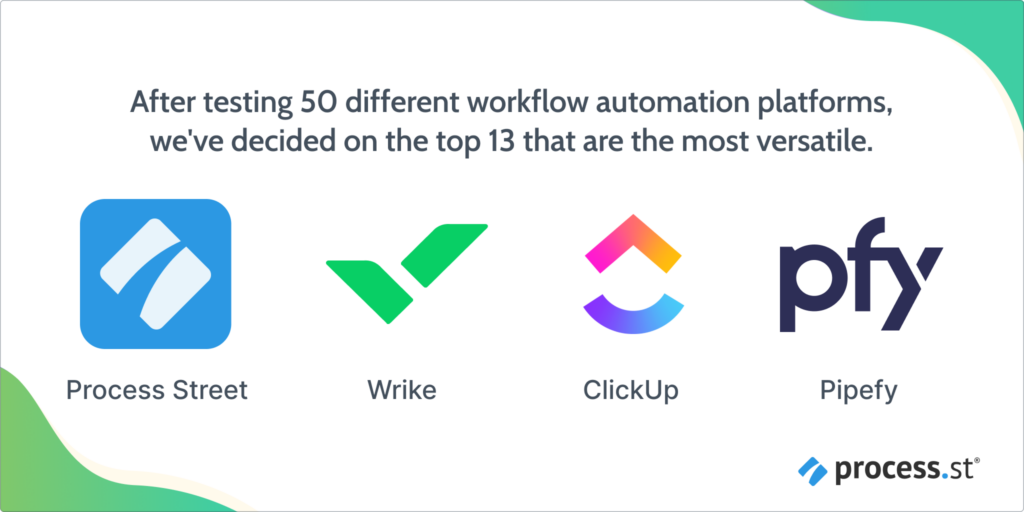
When it comes to workflow automation, choosing the right workflow software is crucial.
That’s why, after testing 10 different software packages, we’ve decided on the top three that are the most versatile.
Process Street
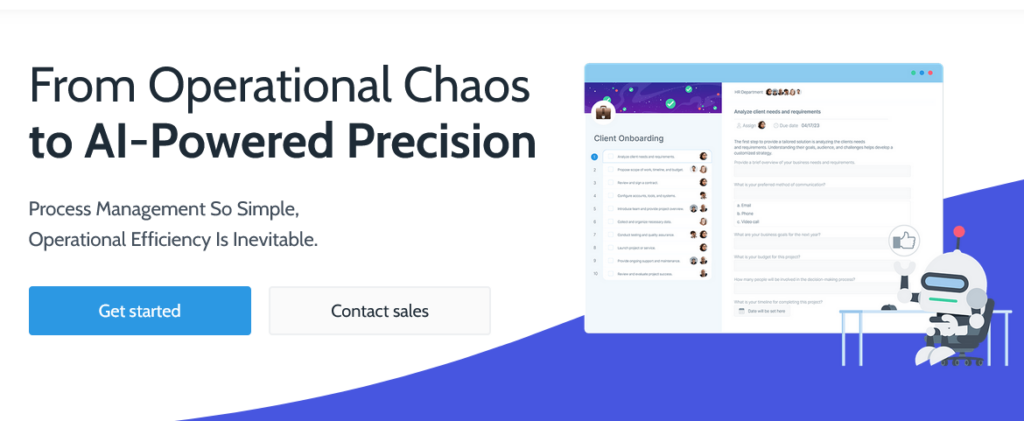
Process Street stands out because of its user-friendly interface and comprehensive features.
Process Street’s workflow-based approach simplifies complex processes, promoting real-time team collaboration.
Process Street is the most powerful workflow management tool we’ve tried. It’s capable of handling highly complex workflows, large teams, and heavy workloads.
Pros:
- No-code, cloud-based platform.
- Intuitive interface with drag-and-drop functionality.
- Extensive library of industry-specific templates.
- Seamless integration with 100’s of tools and apps.
- Robust reporting and analytics capabilities.
- Mobile app
- An array of features, including an AI-powered workflow builder.
Cons:
- No free plan
Monday.com
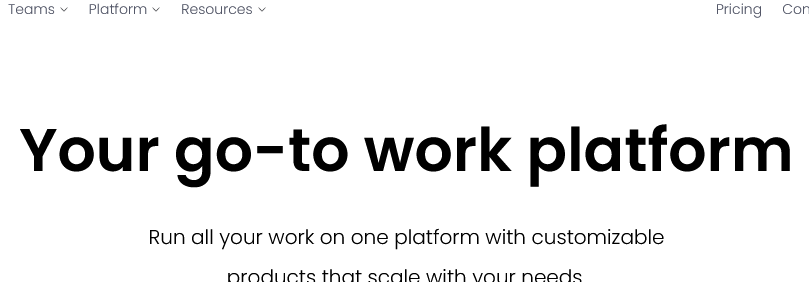
Monday is a popular software tool offers a visually appealing interface and customizable workflow templates.
With its automation options, collaboration features, and integration capabilities, Monday.com empowers teams to streamline their workflows.
Pros:
- Customizable and visually appealing layout.
- Automation options with customizable rules and triggers.
- Integration with some popular tools and platforms.
Cons:
- Higher cost compared to some other options.
- Advanced features available in higher-priced plans.
Wrike
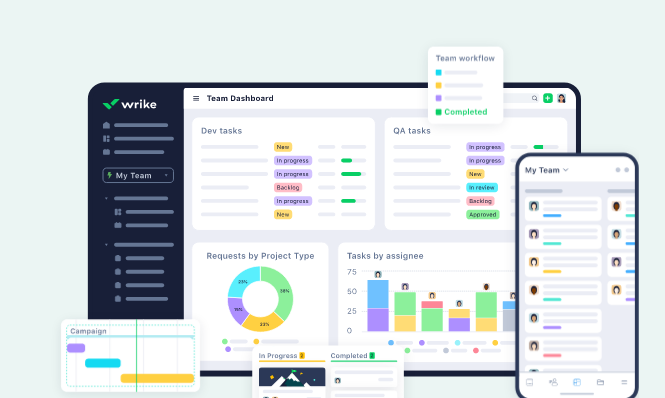
Wrike provides a complete platform for planning, executing, and tracking projects and workflows.
It offers customizable workflows and reporting and analytics capabilities.
Wrike is a good solution for organizations looking for flexibility and in-depth project management features.
Pros:
- Flexible and customizable workflow templates.
- Collaboration and communication features.
- Advanced reporting and analytics capabilities.
Cons:
- May not be suitable for beginners.
- The interface may be overwhelming initially.
Kissflow
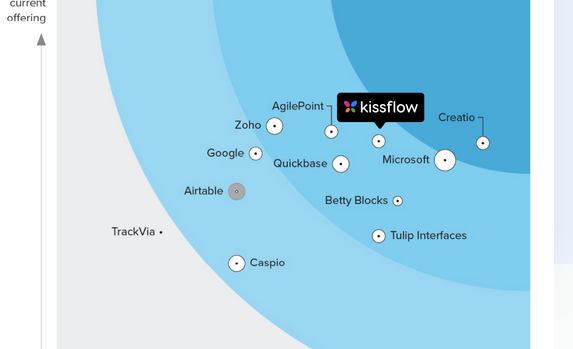
Kissflow is a cloud-based workflow automation software that enables businesses to streamline their processes and improve efficiency. It offers customizable workflow templates, drag-and-drop interface, and integration with various third-party apps. Kissflow’s features include form builder, reporting and analytics, and collaboration tools, making it suitable for organizations of all sizes.
Pros:
- User-friendly interface with drag-and-drop functionality.
- Customizable workflow templates.
- Integration with third-party apps.
- Reporting and analytics capabilities.
- Collaboration tools for real-time communication.
Cons:
- Some advanced features may require additional learning curve.
- Pricing tiers may not suit all budgets.
ClickUp
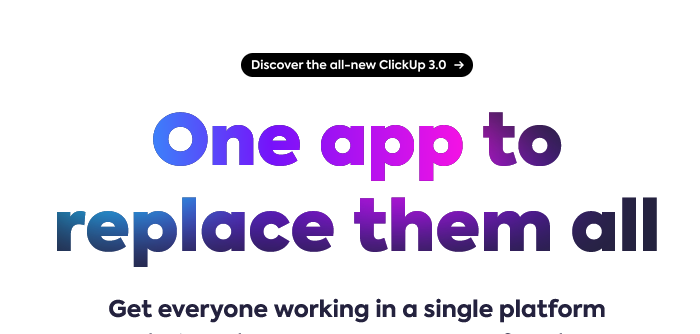
ClickUp is a project management and workflow automation platform that provides teams with a centralized workspace to plan, collaborate, and track their work. It offers customizable task lists, calendars, and Gantt charts, as well as automation features such as custom automations and recurring tasks. ClickUp also integrates with various tools and services, enabling seamless workflow automation.
Pros:
- Centralized workspace for project management.
- Customizable task lists and views.
- Automation features for streamlining workflows.
- Integration with third-party tools and services.
- Collaboration tools for team communication.
Cons:
- May be overwhelming for some users due to extensive features.
- Learning curve for mastering advanced functionalities.
Pipefy
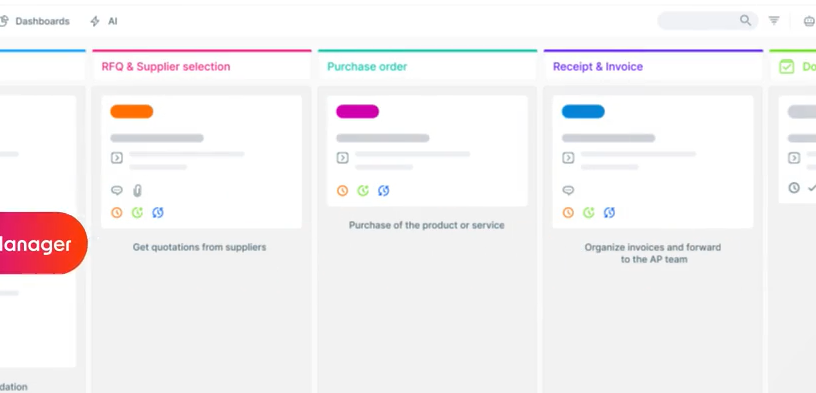
Pipefy is a workflow automation platform that enables businesses to create, manage, and automate their processes. It offers customizable process templates, Kanban boards, and automation rules to streamline workflows and improve efficiency. Pipefy also integrates with various tools and services, allowing users to connect their workflows with other systems seamlessly.
Pros:
- Customizable process templates.
- Kanban boards for visual workflow management.
- Automation rules to streamline processes.
- Integration with third-party tools and services.
- Reporting and analytics features for performance tracking.
Cons:
- Limited free plan compared to other options.
- Some advanced features may require additional customization.
Zenaton

Zenaton is a workflow automation platform that helps businesses automate their processes and workflows with code. It offers a developer-friendly API and SDKs for various programming languages, allowing developers to integrate workflow automation into their applications easily. Zenaton’s features include task scheduling, event-driven workflows, and monitoring tools for managing complex workflows.
Pros:
- Developer-friendly API and SDKs for easy integration.
- Task scheduling and event-driven workflows.
- Monitoring tools for managing complex workflows.
- Integration with various programming languages and frameworks.
- Scalable architecture for handling large workloads.
Cons:
- Requires programming knowledge for implementation.
- May not be suitable for non-technical users.
Quixy
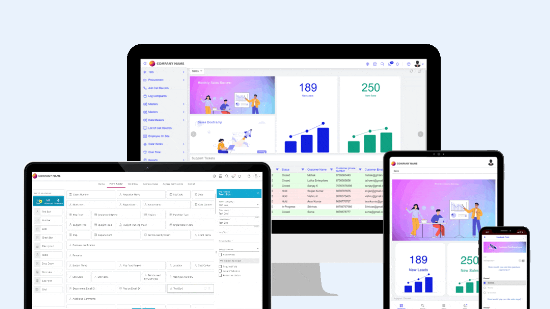
Quixy is a no-code workflow automation platform that empowers businesses to automate their processes without any coding knowledge. It offers a visual drag-and-drop interface, customizable templates, and pre-built connectors for integrating with other systems. Quixy’s features include workflow automation, data management, and reporting tools, making it suitable for businesses looking to streamline their processes quickly and efficiently.
Pros:
- No-code platform for easy workflow automation.
- Visual drag-and-drop interface.
- Customizable templates and pre-built connectors.
- Integration with other systems and databases.
- Reporting and analytics tools for performance tracking.
Cons:
- May have limitations in customization compared to code-based solutions.
- Pricing plans may not suit all budgets.
Workflow automation platforms
Optimizing productivity and efficiency is crucial.
One way to achieve this is through the use of workflow automation platforms.
These powerful tools will allow you to streamline your business processes, saving time, reducing errors, and improving overall productivity.
Understanding workflow automation platforms
These platforms are comprehensive systems that enable businesses to automate and manage their workflows effectively.
They provide a centralized hub for organizing and executing tasks, ensuring smooth and efficient operations.
By automating repetitive and manual tasks, you can free up valuable time and resources to focus on more critical activities.
Workflow automation platforms encompass a range of features, including workflow management tools, which enable you to design, implement, and monitor workflows. These tools offer a visual interface that allows users to map out processes, define dependencies, and set up automation triggers.
For instance, let’s consider a workflow management system example: a small e-commerce business that receives and fulfills customer orders.
With a workflow automation platform, this business can create a streamlined order fulfillment process.
They can easily automate:
- Order verification
- Inventory check
- Packaging
- Shipping
The market offers various workflow tools, including open-source options that provide flexibility and customization options.
Workflow tools and open-source solutions can benefit businesses with limited budgets. However, keep in mind that they often lack the comprehensiveness of paid platforms.
Benefits of workflow automation
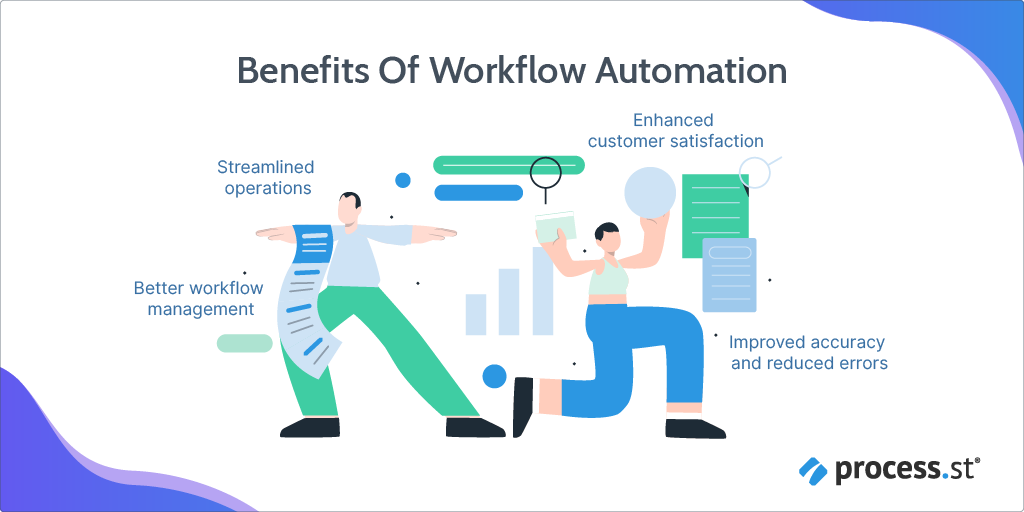
Workflow automation offers numerous benefits to organizations across various industries.
Let’s explore the advantages of implementing workflow automation and how it can revolutionize your business processes.
Streamlined operations and increased efficiency
Workflow automation streamlines operations by eliminating manual and repetitive tasks.
This results in significant time and resource savings, allowing employees to focus on more important activities.
With automated workflows, you’ll achieve higher efficiency, optimize processes, and deliver faster results.
Improved accuracy
Automation minimizes human intervention, leading to improved accuracy and reduced errors.
By following predefined rules and guidelines, you can ensure consistent and error-free execution of processes.
Say hello to boosted data quality, reduced costly mistakes, and enhance overall operational efficiency.
Enhanced customer satisfaction
Business process automation significantly impacts customer satisfaction.
By automating manual processes, you’ll eliminate bottlenecks and deliver products and services faster.
The result? Increased customer satisfaction, improved retention rates, and a competitive edge in the market.
Better workflow management
Automation centralizes and digitizes workflows, enabling better management and oversight.
This means that you can track progress and make data-driven decisions for continuous improvement.
With improved workflow management, you’ll optimize processes, increase productivity, and achieve better outcomes.
Examples of workflow automation
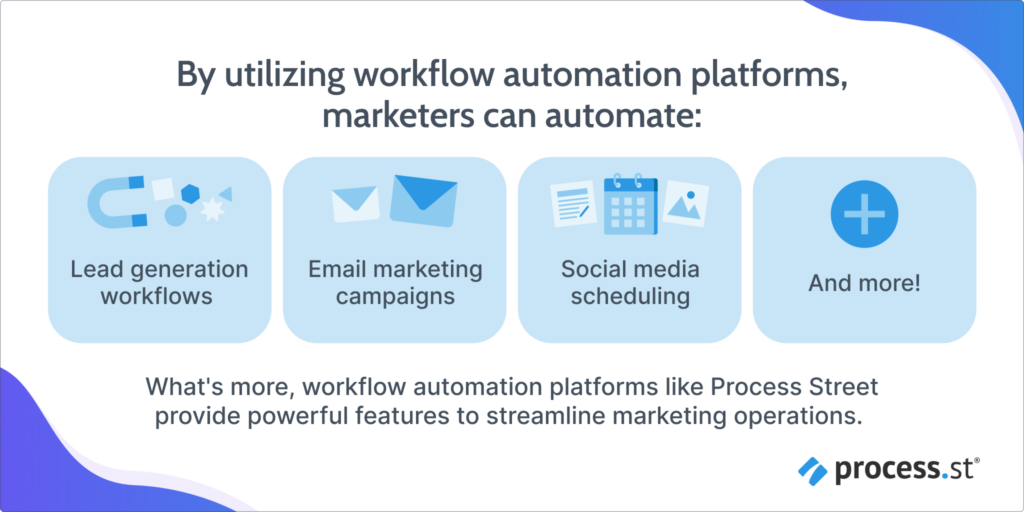
Workflow automation isn’t limited to a single department or industry—it can revolutionize various business operations.
In this section, we will explore some real-world workflow automation examples that highlight the practical applications and benefits of this technology.
These examples will help you see the meaning and impact of workflow automation in real-life settings.
Marketing
Imagine a bustling marketing team striving to deliver timely campaigns and engaging content.
With workflow automation, they can streamline their processes and eliminate manual tasks.
For instance, by utilizing workflow automation platforms, marketers can automate:
- Lead generation workflows
- Email marketing campaigns
- Social media scheduling
- And more!
This enables them to focus on creating compelling content and analyzing campaign performance, resulting in higher conversion rates and increased ROI.
What’s more, workflow automation platforms like Process Street provide powerful features to streamline marketing operations.
Imagine a scenario where you’re launching a new marketing campaign.
With Process Street, you can create a workflow that guides your team through each step, from campaign planning and content creation to social media scheduling and performance tracking.
The platform’s task assignments, notifications, and approval processes ensure smooth coordination and timely execution, enabling your team to deliver impactful marketing campaigns seamlessly.
Customer service
A customer service department faces a constant influx of inquiries and support tickets.
But did you know that workflow automation platforms can revolutionize the customer service experience?
For example, you will create efficient ticket management systems using Process Street’s workflow automation capabilities.
You can also ensure a smooth customer journey by automating:
- Ticket assignment
- Escalation processes
- Response time tracking
Integration with CRM systems allows support agents to access relevant customer information quickly.
And by using Forms, you can create automated customer satisfaction surveys to help gauge feedback and identify areas for improvement.
With Process Street, customer service teams can easily handle a high volume of inquiries, ensuring prompt and satisfactory resolutions.
HR
The HR department often juggles multiple processes, from onboarding new employees to managing performance reviews.
Here too, Process Street steps in as the HR superhero, simplifying these complex workflows.
With pre-built templates and customizable forms, onboarding becomes a breeze.
Automated reminders ensure that all necessary documents are collected, contracts are signed, and all essential training is done on time.
Performance review workflows streamline the evaluation process, providing a structured approach for managers and employees.
And Process Street’s robust reporting features provide valuable employee performance and engagement insights.
With Process Street, HR teams can efficiently manage tasks, save time, and create a positive employee experience.
Workflow automation platforms are essential!
By embracing workflow automation platforms, you unlock a world of benefits.
Say goodbye to tedious processes and hello to streamlined operations.
Harness the power of automation to minimize errors, increase accuracy, and boost collaboration among your team members. Watch as productivity soars, freeing up valuable time and resources for innovation and growth.
From the comprehensiveness of Process Street to the visual appeal of Monday.com and the reporting features of Wrike, the best workflow software empowers you to choose the perfect tool for your organization’s needs.
But don’t settle for mediocrity when you can embrace excellence!
Remember, workflow automation platforms are the heroes that can revolutionize the way you work.







